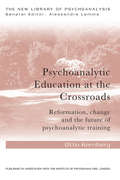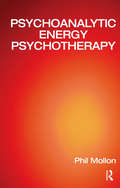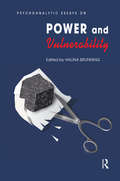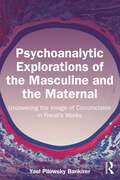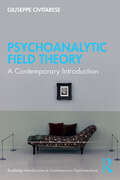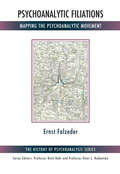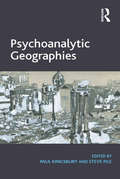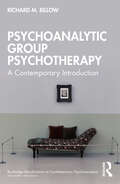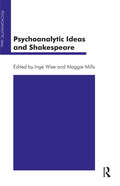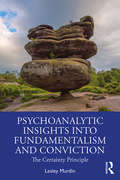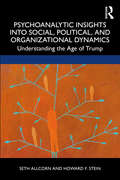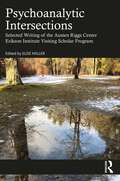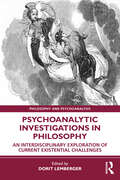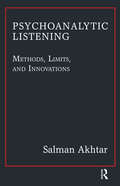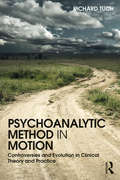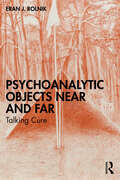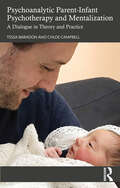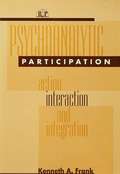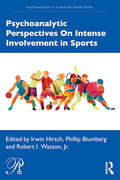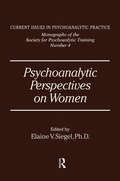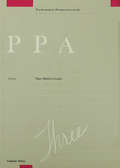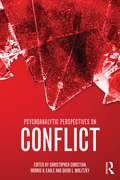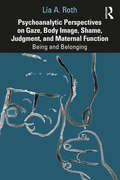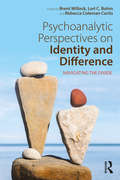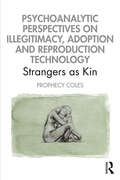- Table View
- List View
Psychoanalytic Education at the Crossroads: Reformation, change and the future of psychoanalytic training (The New Library of Psychoanalysis)
by Otto Friedmann KernbergTraining in psychoanalysis is a long and demanding process. However, the quality of education available is hugely variable across the world. The structure of psychoanalytic education, centered on the hierarchical "training analysis" system, reflected a concerted effort to maintain a stable and high quality educational process. However, throughout time this system has become a major source of institutional contradictions that affect the training of candidates, the scientific developments within psychoanalysis, and the nexus of psychoanalytic theory and practice with the surrounding scientific, social and cultural world. Psychoanalytic Education at the Crossroads examines the ways in which group processes, the hierarchal culture in institutes, the influence of individual personalities, the lack of research and the faults in supervision can all stifle creativity and hinder candidates’ progress. In this compelling work, Otto Kernberg sets out clear suggestions for how these issues can be addressed, and how he sees the future of psychoanalytic education across all psychoanalytic settings and schools of thought. The first part of this volume is focused primarily on the analysis of the nature of these problems and their effects on the personal analysis and supervision of candidates; on theoretical and clinical seminars; on selection, progression, and graduation; on educational principles and requirements, developments of theory and technique and, in particular, limitation versus expansion of the realm of interests and applications of psychoanalysis. The second part of this volume deals with proposals of solutions to the problems encountered, and major suggestions for innovation in psychoanalytic education. The author’s work in this area has been hugely influential. Kernberg has made a substantive difference in the development of psychoanalytic institutes and education, and continues to do so. Psychoanalytic Education at the Crossroads will be essential reading to anyone involved in psychoanalytic education, whether as a psychoanalyst, psychoanalytic psychotherapist, trainee, trainer, or supervisor.
Psychoanalytic Energy Psychotherapy: Inspired By Thought Field Therapy, Eft, Tat, And Seemorg Matrix
by Phil MollonPeople like to talk. We know that talking to an attentive and thoughtful listener can be helpful in clarifying conscious and unconscious feelings, thoughts, and motivations. But is talk enough? The complex physiology of anxiety and traumatic stress reactions is often stubbornly persistent, despite therapeutic exploration in both conscious and unconscious areas of the mind. In the case of severe trauma, talking can stir up the emotions and associated bodily disturbance without providing any resolution - sometimes leaving clients feeling worse. The developing field of energy psychology offers an entirely new perspective and gamut of techniques for locating where these traumatic patterns are encoded. They are not in the mind - but in the energy system at the interface of psyche and soma. By addressing these realms concurrently, a powerful therapeutic synergy emerges that allows rapid and deep shifts in the patterns of distress that drive the psychosomatic system.
Psychoanalytic Essays on Power and Vulnerability
by Halina Brunning"This paper is based on research into European economics and politics on the basis of ten months travelling in ten countries, as well as on four workshops run in Europe. Two hypotheses will be explored: It is possible to discern psychodynamic evidence that unresolved humiliation trauma is being re-evoked and recycled by attempts to find solutions and cures through the tyranny of austerity measures. But the question will be asked whether these are “chosen trauma” (Volkan, 2010) which may be at the heart of the foundation matrix (Foulkes, 1973) of the European Community. The exploration of political and economic leadership in the crisis in the European Union builds on the notion of society as a large group proliferating crises of identity. From a systemic perspective it is possible to analyse the nation states of Europe protesting with regressive nationalism, refusing collaboration by engaging in economic warfare while at the same time attempting rescue packages. The protest could be seen as defensive denial of their humbling at the hands of the over-ambitious aspects of the European single currency project and the demise of the potency of the nation state. The concluding section reflects on these issues and tries to distinguish the recycling of humiliation trauma from defence against the experience of being humbled."
Psychoanalytic Explorations of the Masculine and the Maternal: Uncovering the Image of Circumcision in Freud’s Works
by Yael Pilowsky BankirerIn this book, Yael Pilowsky Bankirer reads into Freud's writings with the unique prism of circumcision as a marker for both the formation of masculine identity, and for matricide, the disappearance of the mother.Pilowsky Bankirer uses Freud’s idea of circumcision within a text as a Leitfossil: a key-fossil through which an unresolved unconscious conflict can be traced. She conducts a close reading of Freud’s texts – including Little Hans, The Wolf Man, Totem and Taboo and Moses and Monotheism – to illuminate and uncover the textual unconscious, deconstruct the explicit narrative and open alternative psychoanalytic possibilities inherent to the encounter with the maternal realm. Throughout the volume, Pilowsky Bankirer informs her analysis by considering the work of Freud in tandem with that of Lacan, Kristeva, Irigaray, Derrida, Benjamin, Butler and more.Psychoanalytic Explorations of the Masculine and the Maternal: Uncovering the Image of Circumcision in Freud’s Works will be of interest to scholars of psychoanalysis and practising analysts alike, particularly those interested in the intersection of gender studies and psychoanalysis.
Psychoanalytic Field Theory: A Contemporary Introduction (Routledge Introductions to Contemporary Psychoanalysis)
by Giuseppe CivitareseWritten by one of the world’s renowned Bionian Field Theory scholars, this foundational volume provides a thorough introduction to all facets of psychoanalytic field theory, one of the most lively and original currents of thought in contemporary psychoanalysis, to offer new answers to age-old questions around how psychic change occurs. With clinical examples to illuminate key themes of therapeutic effectiveness, current controversies, and future developments, the book presents a radically intersubjective view of the analytic process that focuses on the plane of unconscious communication common to both analyst and patient, moving beyond the I/you division to access the shared substance of the psyche. It centers the unconscious not as a hellish region of the psyche but as an important function of the personality that gives meaning to emotional experience. Offering clear expositions of complex concepts and linking to more detailed sources of information, this book is important reading for all clinicians, trainees, and students interested in contemporary psychoanalysis.
Psychoanalytic Filiations: Mapping the Psychoanalytic Movement (The History of Psychoanalysis Series)
by Ernst FalzederThis book presents a collection of fifteen essays on the early history of psychoanalysis, focusing on the network of psychoanalytic "filiations" ("who analysed whom") and the context of discovery of crucial concepts, such as Freud's technical recommendations, the therapeutic use of countertransference, the introduction of the anal phase, the birth of the object-relations-model as opposed to the drive-model in psychoanalysis, and the psychotherapeutic treatment of psychoses. Several chapters deal with key figures in that history, such as Sandor Ferenczi, Karl Abraham, Eugen Bleuler, Otto Rank, and C.G. Jung, their respective relationship to Freud, and the consequences that their collaboration - as well as conflicts - with him had for the further development of psychoanalysis up to the present day. Other chapters give an overview of the publications of Freud's texts and of unpublished documents (the "unknown Freud"), the editorial policy of the publications of Freud's letters, and the question of Freud's negative attitude toward America.
Psychoanalytic Geographies
by Steve Pile Paul KingsburyPsychoanalytic Geographies is a unique, path-breaking volume and a core text for anyone seeking to grasp how psychoanalysis helps us understand fundamental geographical questions, and how geographical understandings can offer new ways of thinking psychoanalytically. Elaborating on a variety of psychoanalytic approaches that embrace geographical imaginations and a commitment toward spatial thinking, this book demonstrates the breadth, depth, and vitality of cutting edge work in psychoanalytic geographies and presents readers with as wide a set of options as possible for taking psychoanalysis forward in their own work. It covers a wide range of themes and perspectives in terms of theoretical approaches such as Freudian, Lacanian, Kristevan, and Irigarayian; conceptual issues such as space, power, identity, culture, political economy, colonialism, ethics, and aesthetics; disciplinary insights including Geography, English, Sexuality Studies, and History of Science; as well as empirical contexts such as the reception of psychoanalysis in early twentieth century England, psychoanalytic geographies of violence and creativity in a small Mexican city, visual cultures of second-generation Iranian artists living in Los Angeles, and the hysterical underpinnings of climate change scepticism.
Psychoanalytic Group Psychotherapy: A Contemporary Introduction (Routledge Introductions to Contemporary Psychoanalysis)
by Richard M. BillowIn this comprehensive volume, Richard M. Billow provides a thorough introduction to group psychotherapy from a psychoanalytic perspective. Billow integrates contemporary psychoanalytic thinking with Freudian and Kleinian core concepts, as well as Bion’s early group theory and his later metapsychology, to provide a holistic overview of group therapy and its potential benefits for patients. He incorporates major psychoanalytic thinkers outside the American relational mainstream – such as Lacan, Laplanche, Kaes, Foulkes, and Pichon Riviere, as well as his own prominent contributions to the field – to provide a unique and interdisciplinary overview. Throughout the chapters, readers will be introduced to challenging clinical experiences that illustrate some of the similarities and differences among psychoanalytic and other psychodynamic group approaches. Offering guidelines on how to harness and conduct the group, Billow provides exceptional insight into the veritable benefits of maintaining an analytic stance within the clinical setting. Written in a clear and accessible style, this book is a vital tool for students and professionals interested in a thorough overview of psychoanalytically-based group treatments.
Psychoanalytic Ideas and Shakespeare (The Psychoanalytic Ideas Series)
by Inge Wise Maggie MillsPsychoanalysis is concerned with the vicissitudes of life: loss, grief, mourning, guilt and also with reparation and creativity, with death and rebirth, as is the work of Shakespeare. These papers link the Bard's universe to psychoanalytic thought and practice and show us how much both worlds have in common. In today's world we are moved by Shakespeare's plays whose themes are brought to life with a richness and creativity that has not dimmed with the passing of time. Echoing Freud's fascination with Shakespeare, Michael Conran, Peter Hildebrand, Gerald Wooster, and Peter Buckroyd find much to feast on in King Lear, Twelfth Night, All's Well That Ends Well, The Tempest, Macbeth, and The Winter's Tale. The interplay of inner and outer world, inner and outer reality, brings about a rich tapestry of conflicts, desires, anxieties, challenges and resolutions that were as true then as they are now.
Psychoanalytic Insights into Fundamentalism and Conviction: The Certainty Principle
by Lesley MurdinPsychoanalytic Insights into Fundamentalism and Conviction: The Certainty Principle examines the role of, and need for, certainty in mental life, addressing questions raised by fundamentalism and extremism and exploring its relation to human nature. Murdin proposes a new synthesis in which certainty itself can be a cause of suffering and part of a defensive manoeuvre, and considers how the need for certainty can be managed in a positive way, rather than creating fear and extreme emotional responses. Illustrated throughout with examples from psychotherapy practice, literature and international politics, this book considers how the quest for certainty dominates much of human thinking. Murdin examines personal relationships, including politics and religion, where assumptions are taken for granted but function to hide fears and doubts, and argues that fundamentalist elements can generate harm in anyone but can be mitigated with understanding and work in therapy. Psychoanalytic Insights into Fundamentalism and Conviction helps to identify the underlying convictions that are causing mental harm. It is essential reading for psychotherapists, psychoanalysts and counsellors in practice and in training, and will be of interest to readers interested in fundamentalist states of mind.
Psychoanalytic Insights into Social, Political, and Organizational Dynamics: Understanding the Age of Trump
by Seth Allcorn Howard F SteinThis fascinating interdisciplinary work explores U.S. politics since 2015 and offers psychodynamic insights into the unconscious undercurrents of contemporary culture and politics in the United States. Allcorn and Stein expertly lead readers up the steep learning curve of understanding the Trump era by exploring seven key elements of recent political dynamics. Using the complementary psychodynamic models of object relations, Group Relations and Karen Horney’s tripartite theory, this book makes sense of the Age of Trump and its chaotic world of alternate facts, conspiracy theories, reality TV politics, hoax pandemics, and the sweeping chaos of life in the United States. This sense-making relies on two triangulations. The first represents the complex systemic political scene. The second uses three psychoanalytic theories to understand social, political, and organizational dynamics. This book is a key resource for helping readers know and understand ourselves, our fellow citizens, colleagues, family, friends and what Trump and his followers call "them" such as liberals and foreign immigrants, as well as both the larger polarized social and political context in the United States today. The book also provides concrete examples of how these discoveries can be operationalized both in organizations and at the level of national government and leadership. This book is an essential reading for students in organizational behavior including leadership and how governments operate, as well as behavioral health professionals consulting or offering therapy to organizations.
Psychoanalytic Intersections: Selected Writing of the Austen Riggs Center Erikson Institute Visiting Scholar Program
by Elise MillerPsychoanalytic Intersections examines the influence and legacy of the Austen Riggs Center, one of the oldest psychoanalytically oriented psychiatric hospitals in America, and home of the Erikson Institute for Education and Research. Former Erikson scholar Elise Miller brings together the work of a wide range of clinicians and scholars who have participated in the Erikson Institute’s Visiting Scholars Program. Representing a variety of disciplines, departments, and methodologies, the contributors exemplify the cutting edge of interdisciplinary work at the intersections of psychoanalysis and academia, psychiatry, psychology, psychoanalysis, and hospital and private practice settings. For this unique collection, each contributor has selected a piece of their published work to be presented with a new afterword reflecting on how time spent in a clinical setting shaped their thinking and writing. These personal narratives also offer a unique opportunity to consider how this kind of scholarship was produced, and what it can teach us about the disciplinary crossings and migrations of applied psychoanalysis, especially as it continues to extend its insights and influences out into the world around us. Psychoanalytic Intersections will be of great interest to psychoanalytic clinicians, psychiatrists, and psychologists engaged in cross-disciplinary work, and to academics and scholars of interdisciplinary psychoanalytic studies.
Psychoanalytic Investigations in Philosophy: An Interdisciplinary Exploration of Current Existential Challenges (Philosophy and Psychoanalysis)
by Dorit LembergerThis pioneering volume explores and exemplifies the relevance of psychoanalysis to contemporary philosophical problems. The novelty of the book's viewpoint is the consideration of psychoanalysis as an existentialist mode of thinking that deals with current existential problems such as loneliness, uncertainty, struggling with personal tragedies and rehabilitation. Each chapter presents classic aspects of psychoanalytic theory based on Greek tragedies, as well as their similarities with interdisciplinary aspects in other areas of study like modern literature, hermeneutics, and philosophy of language. To deepen each subject, each chapter also applies an interdisciplinary methodology that illuminate previously hidden insights arising from the fusion of psychoanalysis and philosophy. Featuring contributions from well-known scholars like Professor Avi Sagi and Professor Dov Schwartz, as well as more up-and-coming writers, the book suggests possible implications of philosophical, hermeneutical, and literary theories to the perception of post-modern issues concerning agency and the subjective emotional world. Psychoanalytic Investigations in Philosophy is of great interest to scholars of psychoanalysis and hermeneutic philosophy, as well as teachers and academics who want to explore new teaching methods in various disciplines, and general-interest readers who wish to expand their horizons around concepts that can be applied to better understand themselves and the age in which we live.
Psychoanalytic Listening: Methods, Limits, and Innovations
by Salman Akhtar'Joseph Breuer's celebrated patient, Anna O., designated psychoanalysis to be a "talking cure". She was correct insofar as psychoanalysis does place verbal exchange at the center stage. However, the focus upon the patient's and therapist's speaking activities diverted attention from how the two parties listen to each other. Psychoanalysis is a listening and talking cure. Both elements are integral to clinical work. Listening with no talking can only go so far. Talking without listening can mislead and harm. And yet, the listening end of the equation has received short shrift in analytic literature. This book aims to rectify this problem by focusing upon analytic listening. Taking Freud's early description of how an analyst ought to listen as its starting point, the book traverses considerable historical, theoretical, and clinical territory. The ground covered ranges from diverse methods of listening through the informative potential of the countertransference to the outer limits of our customary attitude where psychoanalytic listening no longer helps and might even be contraindicated.'- Salmon Akhtar, from his Introduction
Psychoanalytic Method in Motion: Controversies and evolution in clinical theory and practice
by Richard TuchPsychoanalytic Method in Motion identifies and examines varied controversies about how psychoanalysts believe treatment should best be conducted. Irrespective of their particular school of thought, every analyst builds up a repertoire of his favored ways of working, which some analysts come to see as the most efficacious approach to treatment available. While such differences of opinion are unsettling, and may even threaten to tear the field asunder, this book sees these differences as benefitting psychoanalysis by improving the ways in which psychoanalysts and psychoanalytic psychotherapists practice. In this book, Richard Tuch covers the waterfront by examining controversies that further the field by raising questions that help evolve the treatment, challenging every analyst to re-think what they are doing in the consulting room…and why. Some of the chief controversies explored include: the enactment debate—unparalleled tool or regrettable error? whether analysts can truly be "objective"—whatever that means the advantages and disadvantages arising from the analyst’s use of authority the ways in which theory influences the analyst’s search for data—blinding him to evidence he implicitly discards as irrelevant whether any given treatment approach is more efficacious than others, as some analysts claim the legitimacy of psychoanalysis itself—whether it can truly be considered scientific whether certain methods of supervision are more effective than others whether free association can be considered therapeutic in and of itself the extent to which an analyst preferred clinical theory is a product of his personality Drawing on ideas from a range of different analytic perspectives, this book is an essential and accessibly written guide to working towards best practice in the analytic setting. Psychoanalytic Method in Motion will appeal greatly to both students and practitioners of psychoanalysis and psychoanalytic psychotherapy.
Psychoanalytic Objects Near and Far: Talking Cure
by Eran J. RolnikTouching upon the most sensitive nuances of the analytic encounter, Psychoanalytic Objects Near and Far combines a far-reaching theoretical manifesto with an intimate clinical journal to express curiosity, skepticism and love towards the psychoanalytic clinic, theory and history. Basic concepts and controversies that often become a conceptual ivory tower receive here a new and fresh vitality from the perspective of an experienced clinician, scholar and teacher, all while crossing the boundary of theoretical fantasy. While holding theory as central to the clinical act, Rolnik does not see it as a self-sufficient philosophy, detached from the free spirit of psychoanalysis as a practice and ethics. Rolnik has no need for iconoclasm. He is committed to the curative speech – his patients’ and his own – as well as receptiveness to the unconscious space in the most Freudian sense of the word. This volume will be of great interest to analysts in practice and in training, and to any reader interested in the analytic process.
Psychoanalytic Parent-Infant Psychotherapy and Mentalization: A Dialogue in Theory and Practice
by Chloe Campbell Tessa BaradonThis book is an account of best practice in psychoanalytic parent-infant psychotherapy (PPIP) and mentalizing, bringing the two approaches in dialogue in relation to infancy. While being similar, PPIP and mentalizing emphasize different aspects of interpersonal processes and apply different ways of intervening. In this text, chapters detail how the models are put into practice, describing the different settings in which they are applied, and the research that has been undertaken to shape them. Exploring the ideas and practice of both approaches, including how they may complement each other and where differing stances may be adopted in relation to clinical material and therapy, this volume enriches the range of ways of working available to the clinician. Psychoanalytic Parent-Infant Psychotherapy and Mentalization provides an overview of the practices of PPIP and mentalization for professionals, but also for anyone interested in understanding the model of psychotherapy and the ideas behind it.
Psychoanalytic Participation: Action, Interaction, and Integration (Relational Perspectives Book Series #16)
by Kenneth A FrankIn Psychoanalytic Participation: Action, Interaction, and Integration, Kenneth Frank argues that the gulf between analysis and what he terms "action-oriented" or cognitive-behavioral techniques is anachronistic and has unnecessarily limited the repertoire of analytically oriented clinicians. In point of fact, action-oriented and even cognitive-behavioral techniques may be employed in ways that are consistent with the analytic goal of promoting profound personality change, and so may be profitably incorporated into analytic treatments. Anchoring his discussion in a contemporary two-person model of psychoanalysis, Frank clarifies and extends the shift toward analyst participation that has developed within recent relational theorizing. On the basis of this orientation, which calls attention to the therapeutic importance of the real qualities of the analyst and of the analytic relationship, Frank sets forth a pragmatic analytic approach that balances traditional "process" elements with patients' problem-solving and outside progress in realizing life goals. By letting themselves be known by their patients and by participating intensively and actively in their treatment, analysts as analysts can help patients shape new and adaptive behaviors in their daily lives. It is the participatory possibilities growing out of a contemporary relational perspective that provide the ground for a rapprochement between psychoanalysis and cognitive-behavior therapy. To this end, Frank presents numerous examples of how action-oriented, cognitive-behavioral principles and techniques can be used to potentiate and accelerate the analytic process. At once scholarly and exploratory, pragmatic and visionary, Psychoanalytic Participation helps shepherd psychoanalysis into the 21st century while making psychoanalytic wisdom - both traditional and contemporary - available to the broad community of psychotherapists appreciative of the usefulness of cognitive-behavioral treatment strategies.
Psychoanalytic Perspectives On Intense Involvement in Sports (Psychoanalysis in a New Key Book Series)
by Irwin HirschThis book is a unique volume that brings a variety of psychoanalytic perspectives to the study of sport. It highlights the importance of sports for different individuals and how the function and use of sports can be brought into the consulting room. Passionate interest in actively engaging in sports is a universal phenomenon. It is striking that this aspect of human life, prior to this volume, has received little attention in the literature of psychoanalysis. This edited volume is comprised largely of psychoanalysts who are themselves avidly involved with sports. It is suggested that intense involvement in sports prioritizes commitment and active engagement over passivity and that such involvement provides an emotionally tinged distraction from the various misfortunes of life. Indeed, the ups and downs in mood related to athletic victory or defeat often supplant, temporarily, matters in life that may be more personally urgent. Engaging in sports or rooting for teams provides a feeling of community and a sense of identification with like-minded others, even among those who are part of other communities and have sufficient communal identifications. This book offers a better psychoanalytic understanding of sports to help us discover more about ourselves, our patients and our culture, and will be of great interest to psychotherapists and psychoanalysts, or anyone with an interest in sport and its link to psychoanalysis and mental health.
Psychoanalytic Perspectives On Women
by Elanie V. SiegelFirst published in 1992. Routledge is an imprint of Taylor & Francis, an informa company.
Psychoanalytic Perspectives on Art, V. 3
by Mary Mathews GedoThis new hardcover annual offers a unique scholarly format, an interdisciplinary dialogue that, it is hoped, will foster the development of a sound, useful methodology for applying psychoanalytic insight to art and artists. The series provides a medium for those who study art, those who interpret it, and occasionally those who create it, formally to explore the meaning of an artistic work as the direct reflection of the inner world of its creator. Within each volume, individual topics are addressed by either an art historian or a psychoanalyst, with a response frequently tendered by an expert from the other field. Reviews of important books of cross-disciplinary interest are treated in a similar manner, and include rebuttals by the authors themselves. It is precisely this exchange of ideas among scholars with difference perspectives on the meaning of a work of art that sets PPA apart from the standard art history publication. Its depth of scholarship, coupled with its innovative format, make it a fascinating addition to the burgeoning field of psychoanalytic studies of art history.
Psychoanalytic Perspectives on Conflict (Psychological Issues)
by Morris N. Eagle Christopher Christian David L. WolitzkySince its inception, and throughout its history, psychoanalysis has been defined as a psychology of conflict. Freud’s tripartite structure of id, ego and superego, and then modern conflict theory, placed conflict at the center of mental life and its understanding at the heart of therapeutic action. As psychoanalysis has developed into the various schools of thought, the understanding of the importance of mental conflict has broadened and changed. In Psychoanalytic Perspectives on Conflict, a highly distinguished group of authors outline the main contemporary theoretical understandings of the role of conflict in psychoanalysis, and what this can teach us for everyday psychoanalytic practice. The book fills a gap in psychoanalytic thinking as to the essence of conflict and therapeutic action, at a time when many theorists are re-conceptualizing conflict in relation to aspects of mental life as an essential component across theories. Psychoanalytic Perspectives on Conflict will be of interest to psychologists, psychoanalysts, social workers, and other students and professionals involved in the study and practice of psychoanalysis, psychotherapy, cognitive science and neuroscience.
Psychoanalytic Perspectives on Gaze, Body Image, Shame, Judgment and Maternal Function: Being and Belonging
by Lía A. RothHave you ever been praised or criticized about your body or any part of it? With this question, participants of a research study were invited to share their experiences of body judgment. As participants described, the body is a carrier of messages and the source of judgmental experiences. Psychoanalytic Perspectives on Gaze, Body Image, Shame, Judgment and Maternal Function: Being and Belonging offers an insightful and engaging psychoanalytical account of experiences of shame and fear of rejection, explained through clinical vignettes and research participants’ scripts. Exploring the findings from the individual and social standpoints, as well as the cultural and historical influences, Dr. Roth proposes that judgements are experienced as attacks, with the meaning attributed to the criticized body part, affecting the sense of self and forming a central point of the participants’ identity trauma. Furthermore, that as guilt requires reparative action, shame requires an act of sacrifice to align the individual to the ideal and to preserve the matrix of belonging, thus explaining the participants’ use of alienation as a defense. This book will be of great interest to psychoanalysts and psychotherapists, as well as scholars of culture and religion. Giving a brief introduction to psychoanalytic concepts, with a full glossary, it will also appeal to the non-psychoanalytic reader, interested in body image and how related perceptions and judgements can affect our own sense of Being and Belonging.
Psychoanalytic Perspectives on Identity and Difference: Navigating the Divide
by Brent Willock, Lori C. Bohm and Rebecca Coleman CurtisEvery day, clinicians encounter challenges to empathy and communication while struggling to assist patients with diverse life histories, character, sexuality, gender, psychopathology, cultural, religious, political, racial, and ethnic backgrounds. Most writing pertaining to ideas of similarity, discrepancy, and ‘the Other’ has highlighted differences. Psychoanalytic Perspectives on Identity and Difference: Navigating the Divide offers a different focus, emphasising points of contact, connection, and how divisions between people can be transcended. In-depth case material, astutely elucidated by diverse theoretical approaches, furnishes stimulating ideas and valuable suggestions for facilitating a meeting of minds and psychological growth in patients who might otherwise be difficult or impossible to engage. Exploring how psychoanalysts can navigate obstacles to understanding and communicating with suffering individuals, topics covered include: internal experience of likeness and difference in the patient; in the analyst; and how analysts can find echoes of themselves in patients. Psychoanalysts and psychotherapists will appreciate the importance and value of this wide-ranging, groundbreaking exploration of these insufficiently addressed dimensions of human experience.
Psychoanalytic Perspectives on Illegitimacy, Adoption and Reproduction Technology: Strangers as Kin
by Prophecy ColesIn this book, Prophecy Coles traces the existential history of the unwanted child with particular attention to the illegitimate child, linking myth, literature and clinical practice in the historical and legal context of adoption. From the time of the Reformation in the sixteenth century until the early twentieth century the lives of such children were short-lived. The Adoption Act of 1926 did much to change the moral climate and the fate of the illegitimate child. It provided the child with a legal family and a name. There follows some unexpected difficulties that emerged after World War Two. Adopted children did not necessarily thrive, and young mothers who had been forced to give up a child born out of wedlock revealed their suffering. The sealed records of the illegitimate child’s origins became an issue. Attachment theory and the development of neuroscience underpin the theoretical approach of this book. Today, the children who are available for adoption are older and may be distressed by several years in care. Fundamental to helping these adopted children and their families there needs to be a multi-disciplined therapeutic approach to try and mitigate the damage that has often been done to the early infant brain through trauma. This book brings to life some of the adoption issues through the study of personal memoirs. Each chapter considers adoption from a different angle: the adopted child, the birth mother, the birth father, foster parents and adopting parents. The final chapter discusses some of the problems around adoption that have arisen again with reproductive technology and surrogate mothering. This book will be of interest to all those who have been involved in or affected by adoption. It will be of special interest to those adopting parents who have not been properly prepared or supported in their magnificent work of taking on some of the most troubled children in our society.
